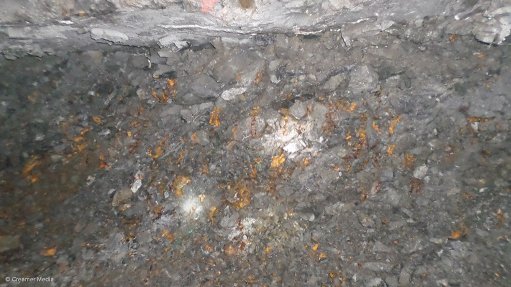
IN SITU GOLD RESIDUE Transvaal Gold Mining Estate’s stopes stopes contain about 36-million tonnes of gold-bearing premined residue
Gold miner Stonewall Resources aims to produce 36 000 oz/y of gold during the next ten years from premined residue at its Transvaal Gold Mining Estate (TGME) complex, in the Sabie-Pilgrim’s Rest goldfield, in Mpumalanga.
Stonewall CEO Lloyd Birrell told Mining Weekly during a visit to the company’s operations last month that TGME’s stopes contain about 36-million tonnes of gold-bearing premined residue upgrading to 3.64 g/t of gold from previous mining operations at the site.
“This is in addition to the complex’s estimated three-million ounces of hard-rock gold that we intend to mine once we have extracted all the gold residue,” he said.
The high-grade, low-tonnage mining methods previously used had resulted in the residue being left behind, which prompted Stonewall to mine large tonnages of the low-grade residue.
Birrell highlighted that TGME is a low-cost, high-margin mining operation, as it is costing the company only between R95/t and R110/t of material mined to transport the residue to the plant.
Accessing the stopes horizontally is a cost-saving factor for the company, as shafts do not have to be constructed, which is typical for most underground operations.
TGME’s horizontal adits also provide easy access to and natural ventilation in the stopes for mineworkers, resulting in further cost savings for the mine, as costly ventilation systems do not have to be installed.
The residue is mined using a system of scraper winches that extract the material, which trucks transport to the plant for processing. The company is installing an industrial vacuuming system to increase material extracting rates.
Birrell noted that Stonewall’s challenges included securing uninterrupted supply of electricity from State-owned power utility Eskom, the volatile state of labour relations and the international investment community’s general lack of confidence in South Africa.
With the two-year wage agreement for the gold mining sector set to expire next month, the company is negotiating with its employees, who are mostly members of the Association of Mineworkers and Construction Union.
Additionally, Mining Weekly reported in January that Stonewall went into a trading halt in November 2014, as its share sale agreement with industrial manufacturer Shandong Qixing Iron Tower, over the sale of Stonewall’s South African subsidiary for $141.5-million, had been cancelled. The Chinese firm abandoned the transaction, citing the decline in world gold prices.
Subsequently, Stonewall announced that it had secured funding of up to A$13.5-million from two unnamed US-based institutional investor groups.
Under the terms of the agreement, the investors will provide an initial A$1.5-million convertible note with a 12-month maturity.
Further, as part of the recapitalisation, existing lender Australian Private Capital Investment has agreed to extend the terms of its current A$4-million loan by 12 months to October 2016.
Stonewall has served a notice of arbitration on Shandong for damages arising from the termination of the agreement. The claim is for $110-million and is currently being heard in Hong Kong under the Hong Kong International Arbitration Centre rules.
Nonetheless, the collapse of the Shandong deal has delayed the company’s aim to process about 30 000 t/m of material by the end of the first quarter of 2015. It now aims to achieve this target by the end of the second quarter of this year.
“Output of 80 000 t/m from TGME will be targeted by the end of this year,” stated Birrell.
Birrell believes that gold deposits worldwide will remain minable for only about 20 years, which is placing significant operational pressures on miners. “
The junior gold mining industry globally and in South Africa is on its knees, particularly exploration companies. The transition from exploration to production has virtually ceased as there is no capital available to fund this transition,” he lamented.
Birrell stated that gold operations’ profit margins had come under significant threat from increased taxation, labour, water and electricity costs, as well as increased service and product supplier costs.
“The consequence of these pressures is that gold production is declining rapidly and inexorably.”